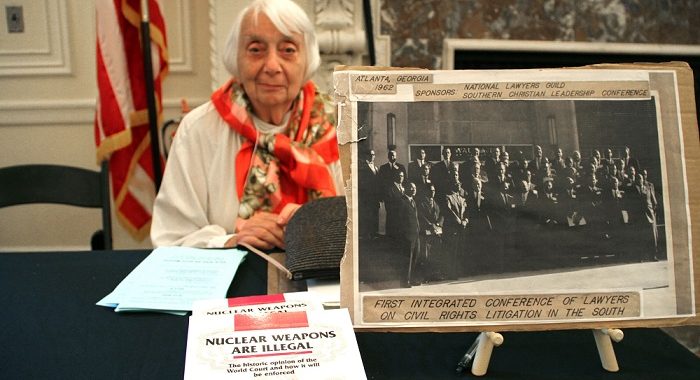By Ann Fagan Ginger, Meiklejohn Civil Liberties Institute Executive Director Emeritus and longtime NLG member
In 2018, and ever since I joined the Guild in 1946 as a third-year law student at the University of Michigan, I have been working to get everyone in the U.S. to use the United Nations Charter and U.N. treaties the U.S. has signed and ratified. This is particularly useful today because the three U.N. Committees that enforce the three treaties we have ratified are anxious to receive reports from residents of all nations that have ratified these treaties describing the human rights violations and enforcement in their countries.
The treaties are: International Covenant on Civil and Political Rights; Convention against Torture and Other Cruel, Inhuman, or Degrading Treatment or Punishment; and Convention on the Elimination of All Forms of Racial Discrimination. As a member of the Guild, one of the founding members of the Berkeley City Commission on Peace and Justice, and Meiklejohn Civil Liberties Institute early Director, I have seen affirmative results from Government bodies concerning the submission of reports by non-governmental organizations on human rights enforcement and violations within their jurisdictions. As a result of raising the issue of homeless people in Berkeley as a human rights issue, and indicating that our organization and other NGOs would send a report on this to the U.N. Human Rights Committee, which enforces the International Covenant on Civil and Political Rights, the city of Berkeley improved its policies sharply.
I have also worked with many law students and new lawyers who came to Meiklejohn Civil Liberties Institute as interns. I learned much from them about the current content of law school training while providing opportunities for them to participate in current human rights activities.
For Democracy to survive Trumpism, in a period of high unemployment and militarism, the Guild needs to continue and expand all of its efforts to enforce human rights in the United States and to stop U.S. human rights violations abroad. Lawyers in the Guild today, it seems to me, have an opportunity, and a duty, to help everyone rebuild Labor Unions, neighborhood organizations and other groups working for human rights.
“OUR 100 HUMAN RIGHTS: The Handbook You Can Use To Exercise All of Your Human Rights” is my next effort to help people, lawyers, and law students to learn all of our human rights—not just the rights in the U.S. Constitution and court opinions, but in the U.N. Charter and the treaties mentioned above, and in the Organization of American States Charter (which few U.S. lawyers or others in the U.S. know about). For each of the 100 human rights in my new book, I describe the reason the right is important and provide all of the statutes, ordinances, court opinions, and other actions that have occurred chronologically when this right was denied.
I have particularly emphasized the Nuremburg Principles, the Universal Declaration of Human Rights, the Convention on the Elimination of Discrimination Against Women (CEDAW), the Convention on the Rights of the Child, and the Convention on the Rights of Persons with Disabilities (CRPD).
I think the Guild will be increasingly important as Trump and his corporate allies increase their attacks on everyone who is not a right-wing Republican, and as the U.S. Supreme Court continues to ignore the precedents set by the Earl Warren Supreme Court, when Guild members frequently won their cases.
I enjoyed the recent NLG Convention, and meeting the present lawyers, law students and law professors now active in the Guild. As one of the relatively few women Guild members in 1947, I was delighted at the number of women members, and members from practically every nation in the world who now practice in the United States.
Solidarity forever! ■
Above: Ann Fagan Ginger at the 2016 #Law4thePeople Convention. (Photo: Shanna Merola)

